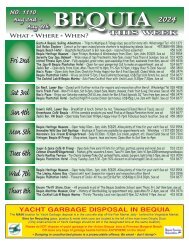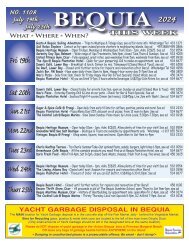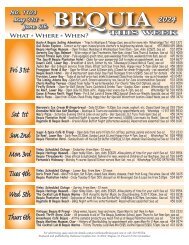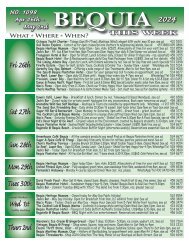Caribbean Compass Yachting Magazine - November 2020
Welcome to Caribbean Compass, the most widely-read boating publication in the Caribbean! THE MOST NEWS YOU CAN USE - feature articles on cruising destinations, regattas, environment, events...
Welcome to Caribbean Compass, the most widely-read boating publication in the Caribbean! THE MOST NEWS YOU CAN USE - feature articles on cruising destinations, regattas, environment, events...
Create successful ePaper yourself
Turn your PDF publications into a flip-book with our unique Google optimized e-Paper software.
YACHT INSURANCE IN THE CARIBBEAN<br />
NOVEMBER <strong>2020</strong> CARIBBEAN COMPASS PAGE 14<br />
by David H. Lyman<br />
“Can I see your insurance documents?” A tall, burly<br />
West Indian Customs agent asked as I was clearing in<br />
at Jolly Harbour, Antigua, last winter. I fished around<br />
in the leather case that contained the ship’s papers,<br />
but no insurance documentation was found.<br />
“Doesn’t appear to be here,” I said. This was the first<br />
time anyone had asked me for proof of insurance upon<br />
clearing into a <strong>Caribbean</strong> island.<br />
“I’ll have to ask the owner,” I said, hoping that would<br />
placate the scowling agent. I wanted to get on with the<br />
lengthy process of clearing into Antigua. I’d just left<br />
the French island of Guadeloupe with this delivery,<br />
and the French process is a breeze. Fill out the form<br />
on a computer hiding in the back of the Pelican<br />
Boutique in the tiny village of Deshaies and you’re on<br />
your way.<br />
“Make sure you bring proof with you when you come<br />
to clear out,” he instructed.<br />
“Yes sir.” I was puzzled at the request. As I stepped<br />
into the dinghy for the ride out to the boat I asked<br />
myself. Why did he ask? Was this a new policy in<br />
Antigua? Why would Antigua need to know if the boat I<br />
was skippering had insurance? Then it dawned on me.<br />
Hurricane Marilyn came through the Virgin Islands<br />
in 1995. She tore up the islands, smashing boats,<br />
ripping off roofs. I’d already survived three hurricanes<br />
in the islands on my Lord Nelson 41, Afaran. The last<br />
one, Luis, came through these same islands only two<br />
weeks earlier. I rode that one out on board, in Maho<br />
Bay on St. John, USVI. Three years before that, I rode<br />
out Hurricane Hugo in Coral Bay. (These stories<br />
appeared in <strong>Caribbean</strong> <strong>Compass</strong> May, June and July<br />
<strong>2020</strong> issues). I came through of each these hurricanes<br />
virtually unscathed, but thousands of boats wound up<br />
smashed, beached, or sunk.<br />
After riding out Hurricane Luis in Maho Bay, I motored<br />
over to West End on Tortola, BVI, curious to see what<br />
was left; then over to Red Hook and Charlotte Amalie on<br />
St. Thomas. Afaran was the only vessel moving on those<br />
waters. The shores were lined with smashed yachts,<br />
piled ten deep in places. A catamaran had been blown<br />
ashore, wedged into a second floor balcony in a condo on<br />
Hassel Island. What a mess. Fiberglass debris was<br />
strewn along the streets and waterfront.<br />
Who cleans up all this? I wondered then. I wanted to<br />
find out.<br />
I spent a week onboard after Luis, then put my boat<br />
back on her mooring in Great Cruz Bay, St. John, and<br />
flew home. I’d had my hurricane experience for that<br />
year, or so I thought.<br />
“Another hurricane is on the way,” a friend told me.<br />
”You going back down?”<br />
“It’s not supposed to be too bad,” I told him. “She can<br />
take care of herself on her mooring.” I said, confidently.<br />
That’s not what happened.<br />
“Marilyn was worse than Hugo,” Derek, a marine<br />
mechanic I knew from St., John, told me years later.<br />
“Tornados spun off the eye as it passed between St.<br />
John and St. Thomas, and trashed the fleet.” My<br />
41-footer was among them.<br />
The guys from St. John Water Sport, who manage<br />
the Hinckley charter feet in Great Cruz, phoned me a<br />
day after Marilyn passed to say my boat and a few<br />
others were just missing off their moorings. “Perhaps<br />
she’s just been blown off her mooring and is drifting at<br />
sea, someplace south of Hispaniola.” So, I sat and<br />
waited. Duncan, a young Vermonter who boat-sat<br />
various yachts in Great Cruz, called. He needed a<br />
letter from me saying he was diving on the wreckage in<br />
the bay for the owners. I sent a letter, and a week later<br />
he called. He’d found the mast, sections of the stern,<br />
the engine and slab of topsides no larger than a<br />
refrigerator door. Afaran was in pieces.<br />
I had called the insurance company the day I heard<br />
Afaran was missing. I called back with Duncan’s news.<br />
They needed a written report from Duncan. Done.<br />
“What will happen?” I asked.<br />
“We need an inventory of personal effects, with<br />
values. The hull is covered for total loss as outlined in<br />
the agreement. You’ll receive a check, less the<br />
deductible, shortly. The personal effects need to be<br />
inventoried before we can issue that check.” I went<br />
about preparing a list. My underwater camera<br />
housings, lights, dive gear and tanks, sextant, radios,<br />
weather fax, SSB, and Loran (this was 25 years ago,<br />
remember). I’d lost my collection of John D. MacDonald<br />
Travis McGee novels, clothes, and my wine glass<br />
collection — priceless, but of no financial value.<br />
“What will happen to the wreckage at the bottom of<br />
the bay?” I asked.<br />
The insurance companies would “work with the<br />
Territory, hire a salvor with a crane and barge, pick up<br />
what’s not of value, and dump it far out at sea.”<br />
The insurance company paid in full, and a year later,<br />
I acquired Searcher, a Bowman 57 ketch.<br />
In researching this story for <strong>Caribbean</strong> <strong>Compass</strong>, I<br />
learned many boats in the <strong>Caribbean</strong> and elsewhere go<br />
uninsured. When an owner’s boat is wrecked beyond<br />
DAVID LYMAN<br />
WHO CLEANS UP THIS MESS?<br />
Every insurance policy should have a ‘wreck removal’<br />
clause. If it doesn’t, don’t sign it.<br />
salvage and there is no insurance, who pays for<br />
cleanup? Was that why the officer in Antigua was<br />
asking for proof of insurance?<br />
Chris Marshall, President of the Sint Maarten<br />
Marine Trades Association, answered my inquiry.<br />
“After Hurricane Irma (2017) we had 177 wrecks, of<br />
which about half were salvaged. That left 82 that were<br />
not. One assumes that they weren’t because they<br />
weren’t insured or the owners just decided to abandon<br />
them. There are quite a few that still remain from<br />
Hurricanes Luis (1995) and Lenny (1999) as well. It<br />
will be a welcome sight to have these wrecks out of<br />
sight. Not the sort of landmarks that we want to be<br />
recognized for!”<br />
Robbie Ferron, Director of the Budget Marine Group,<br />
provided the following: “I understood that in the USVI<br />
a federal program cleaned up most of the wreckage.<br />
Here in St. Maarten things were completely different.<br />
There has been a 550-million-Euro grant from the<br />
Dutch Government to remove all the wrecks. That was<br />
given to the World Bank to supervise, but nothing is<br />
happening. Perhaps they are still arguing whether the<br />
crane doing the work has the proper snow tires. My<br />
experience is that the insurance companies always<br />
take their wreck removal commitment seriously.”<br />
Chris Marshall went on to express his organization’s<br />
view: “We would fully endorse the position that any<br />
yacht wanting to stay in the Simpson Bay Lagoon or<br />
the coastal waters should have the proper insurance<br />
in place. It’s certainly not fair that the local population<br />
DAVID LYMAN<br />
assume the burden of another man’s waste.”<br />
Don Street tells us, “Every insurance policy should<br />
have a ‘wreck removal’ clause. If it doesn’t, don’t sign it.”<br />
When a yacht is damaged, for any reason, the first<br />
thing a claims adjuster wants to know is where the<br />
boat is and in what condition. Is it salvageable? If they<br />
settle your claim for “total loss” they then own what<br />
remains. They can sell what’s left to a salvor, pay to<br />
have what’s left removed and sunk or landfilled, or sell<br />
it back to you.<br />
A few owners do buy back their boats, pay to have<br />
the boat moved to a yard, set up and begin work to<br />
repair the damage themselves. Others buy hurricanewrecked<br />
boats, repair and re-sell or “flip” them, as in<br />
the real estate market.<br />
A few find the task of rebuilding their hurricanedamaged<br />
yacht too time consuming and expensive,<br />
and simply walk away, leaving the unfinished<br />
project in the hands of the boatyard. There are<br />
dozens of boats (I’d not call them yachts at this<br />
stage) that have languished for years in yards in<br />
my home state of Maine, abandoned. Le Marin<br />
Harbor on Martinique has a flotilla of what appear<br />
to be abandoned boats, still floating, at anchor, in<br />
the harbor, grass growing on the waterline and on<br />
their decks.<br />
I asked a few boatyards about this. A few reported<br />
they want to see proof of insurance before hauling. As<br />
a boatowner, I’d want to see the yard’s insurance as<br />
well. What happens should something bad happen to<br />
my boat while being hauled, moved and stored?<br />
Upon clearing out of Jolly Harbour a few weeks after<br />
clearing in, I encountered a friendlier agent in the<br />
Customs office.<br />
“Is there a new policy about proof of insurance being<br />
required to enter Antigua?” I asked, rather sheepishly.<br />
She made a funny face and reached for the phone to<br />
call the main Customs office in St. John.<br />
“Not that I know of,” she told me, waiting for<br />
someone to answer on the other end. She posed my<br />
questions, smiled, and hung up the phone. “Nope. No<br />
new policy about proof of insurance.”<br />
Well, that settled that, I thought, but it still didn’t<br />
answer my basic question, who cleans up the<br />
abandoned hulls we see washed up on the beaches and<br />
sunk in coral gardens among these beautiful islands?<br />
Just more jettisoned plastic from a disposable culture.<br />
Now, if all boats were required to be made of wood, the<br />
wrecks would resolve themselves in an organic process.<br />
Not the sort of landmarks that we want<br />
to be recognized for.

















